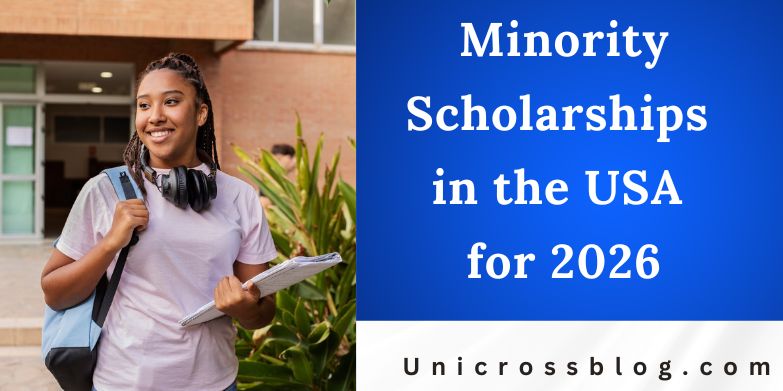Access to higher education remains a cornerstone of opportunity in the United States, yet for many students from minority backgrounds, financial barriers can hinder their dreams. Minority scholarships play a vital role in bridging this gap, providing targeted support to underrepresented groups such as African American, Hispanic or Latino, Native American, Asian American and Pacific Islander, and LGBTQ+ individuals. These awards not only offer financial relief but also foster diversity on campuses, empowering recipients to excel academically, lead in their communities, and contribute to a more inclusive society.
As of 2025, with college costs continuing to rise, these scholarships are more essential than ever. Organizations like the United Negro College Fund (UNCF), Hispanic Scholarship Fund (HSF), and Native Forward Scholars Fund distribute millions annually, often prioritizing students with demonstrated financial need, academic merit, and community involvement. For the 2026 academic year, applications typically open in late fall 2025, with deadlines spanning winter and spring. Eligibility often requires U.S. citizenship or permanent residency, a minimum GPA, and enrollment in accredited institutions. Importantly, many scholarships are renewable, stacking with federal aid like Pell Grants to minimize debt.

Minority Scholarships in the USA for 2026
1. Scholarships for African American Students
African American students face unique challenges, including higher rates of student debt and lower completion rates compared to peers. Scholarships from dedicated organizations help counter these disparities by supporting talent at Historically Black Colleges and Universities (HBCUs) and beyond.
The Jackie Robinson Foundation Scholarship stands out for its holistic approach. Aimed at high school seniors demonstrating leadership and financial need, it provides up to $35,000 over four years, plus mentorship and internship opportunities. Recipients must maintain a 3.0 GPA and engage in community service. Applications open in September 2025, with a January 2026 deadline.
UNCF, the nation’s largest private provider of scholarships to minority students, awards over $100 million yearly across 1,100 schools, including 37 HBCUs. For 2026, eligible undergraduates and graduates from low-income backgrounds can apply for merit- and need-based awards ranging from $2,500 to $10,000. Focus areas include STEM and education; applicants submit transcripts, essays, and FAFSA data by early 2026 deadlines.
The NAACP Inspire Initiatives offer need- and merit-based scholarships for outstanding high school seniors, undergraduates, and graduates. Awards like the Hubertus W. V. Willems Scholarship target male students in engineering, chemistry, physics, or math, providing up to $5,000 non-renewably. Eligibility requires full-time enrollment and a commitment to equity; deadlines fall in March 2026.
The Ron Brown Scholar Program honors intellectually gifted African Americans with community service ties, offering $40,000 over four years plus leadership summits. High school seniors need a 3.0 GPA and strong essays; the December 2025 deadline emphasizes social impact.
For HBCU-focused aid, the Thurgood Marshall College Fund provides scholarships like the $10,000 Nightwing Underrepresented Minorities in Cybersecurity award for juniors and seniors. Tribal members or those with 1/4 Indian blood qualify for the American Nuclear Society Scholarship, up to $1,000 for nuclear-related studies, with a February 2026 deadline.
These opportunities underscore a commitment to nurturing future leaders, with recipients often citing reduced financial stress as key to their persistence.
2. Scholarships for Hispanic and Latino Students
Hispanic and Latino students represent the fastest-growing college demographic, yet many encounter barriers like first-generation status and family obligations. Targeted scholarships emphasize cultural pride and academic achievement.
The Hispanic Scholarship Fund (HSF) empowers over 10,000 scholars annually with awards from $500 to $5,000, prioritizing STEM majors. Open to high school seniors, undergraduates, and graduates of Hispanic heritage (U.S. citizens, permanent residents, or DACA recipients), it requires a 3.0 high school or 2.5 college GPA. The 2026 application cycle runs from September 2025 to February 2026, including essays on heritage and goals.
Hispanic Association of Colleges and Universities (HACU) administers the HACU Scholarship Program, distributing $5,000 awards to full-time students at member institutions. For 2026, options like the Corteva Agriscience Scholarship ($3,425) target agriculture majors with a 2.5 GPA; deadlines are November 2025.
The League of United Latin American Citizens (LULAC) National Scholarship Fund supports community college and four-year students with $2,000 awards. Eligibility includes Hispanic heritage, 2.5 GPA, and Texas residency for some; applications close in March 2026.
Gates Millennium Scholars, now part of the Gates Scholarship, offers full-tuition for low-income Hispanic high school seniors with leadership potential. Up to 300 awards cover unmet need; the September 2025 deadline requires exceptional academics and essays.
The NBCUniversal/LNESC Scholarship aids media-interested Latinos with $10,000 renewable awards. Undergraduates need a 3.0 GPA; January 2026 applications highlight career aspirations.
Additional funds like the El Café Bustelo Scholarship ($5,000) celebrate Latino futures through 800-word essays on heritage. These scholarships not only fund education but also build networks for professional growth.
3. Scholarships for Native American Students
Native American students often navigate reservation-based poverty and cultural disconnection from mainstream education. Scholarships preserve heritage while funding degrees.
Native Forward Scholars Fund, the largest U.S. provider for Native students, awards $15 million yearly in undergraduate, graduate, and vocational aid. Varies by need and merit, with a 2.5 GPA minimum; the 2026 cycle opens November 2025.
The Cobell Scholarship supports high-achieving, community-involved Natives with two- and four-year awards up to $12,000. Enrolled tribal members or those with 1/4 blood quantum apply via OASIS portal; deadlines are March and August 2026.
American Indian Services offers undergraduate scholarships up to $5,000 for accredited schools, requiring full-time enrollment and cultural essays. Applications run continuously into 2026.
The American Indian Education Fund (AIEF) provides competitive graduate and undergraduate awards based on financial need and 3.0 GPA. Up to $10,000 renewable; February 2026 deadline.
For freshmen, the Ardell Bjugstad Scholarship ($500) targets agribusiness majors at any institution. Deadlines align with February 2026.
These programs emphasize sovereignty and success, with many requiring tribal enrollment verification.
4. Scholarships for Asian American and Pacific Islander Students
Asian American and Pacific Islander (AAPI) students span diverse subgroups, with Southeast Asians and Pacific Islanders facing higher poverty rates. Scholarships address these nuances.
APIA Scholars awards $2,500 to $20,000 for poverty-level, first-generation AAPI undergraduates at two- or four-year schools. Requires 2.7 GPA and community service; November 2025 to January 2026 applications.
The Asian Pacific Fund offers five Bay Area scholarships, like the Shui Kuen ($5,000) for restaurant family students. Undergraduates and graduates with 3.0 GPA apply by December 2025.
Banyan College Scholarship ($5,000) supports South Asian New Yorkers with leadership essays; March 2026 deadline.
HANA Scholarship from the United Methodist Church ($5,000 max) aids Asian undergraduates; March 2026.
For women, the Asian Women in Business Scholarship ($2,500) rewards scholarship and entrepreneurship; April 2026.
These funds promote AAPI visibility, often including mentorship.
5. Scholarships for LGBTQ+ Minority Students
LGBTQ+ students from minority backgrounds endure compounded discrimination, making inclusive scholarships crucial for retention.
Point Foundation’s Flagship Scholarship provides up to $12,000 yearly plus support for LGBTQ+ undergraduates, graduates, and allies with 3.3 GPA and community ties. Fall 2026 start; applications open early 2026.
Pride Foundation Scholarships ($1,000 to $10,000) for LGBTQ+ students in Alaska, Idaho, Montana, Oregon, or Washington, regardless of GPA. January 2025 deadline for 2026 year emphasizes barriers overcome.
Stonewall Community Foundation’s Aritzia Scholarship ($10,000) supports LGBTQ+ women pursuing higher education; early 2026 cycle.
Out to Innovate (oSTEM) awards $1,000 to $5,000 for LGBTQ+ STEM juniors with 2.75 GPA; spring 2026.
The Acorn Equality Fund Luke Scholarship ($4,000) aids Illinois LGBTQ+ students outside major counties; March 2026.
These scholarships affirm identity while funding futures.
READ ALSO: Best Business Scholarships for Undergraduates in 2026
FAQs
What if I belong to multiple minority groups?
Many scholarships allow intersectional applications, like LGBTQ+ African American students qualifying for both NAACP and Point Foundation awards. Check specific criteria to maximize options.
Do I need to be a U.S. citizen?
Most require citizenship or permanent residency, but some (e.g., HSF for DACA) are flexible. Undocumented students should explore state-specific aid.
How do I prove minority status?
Tribal enrollment, self-identification, or heritage essays suffice; no universal proof exists, but honesty is key.
Can scholarships cover graduate school?
Yes, many like UNCF and Cobell extend to master’s and PhDs, often with higher awards for advanced study.







